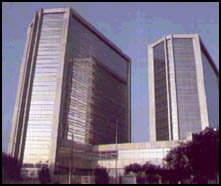 THE PROGRAM FOR THE MODERNIZATION AND STRENGTHENING OF THE PUBLIC ADMINISTRATION THE PROGRAM FOR THE MODERNIZATION AND STRENGTHENING OF THE PUBLIC ADMINISTRATION |

Most of the efforts concerning the modernization programs in infrastructure discussed in the previous section, were coordinated until 1997 by the Office of the Presidential Commissioner for the Modernization of the Public Administration (henceforth called the Office). After 1997, responsibilities were handed over to the ministers in charge. The modernization is taking place based on two big reforms: a) the one related to the execution of public activities (vertical modernization) and b) the one related to the government administration itself -the macrosystems and basic policies- (horizontal modernization). According to the Office, the general objectives of the Program for the Modernization and Strengthening of the Public Administration are:
Contribute to the fulfillment of the commitments derived from the Peace Agreements.
Change the Public Administration into an efficient entity and strengthen government institutions. In this area, the modernization includes: a) Civil Service; b) administrative processes; c) financial administration; d) government control and e) acquisitions.
Deregulate, with the purpose of simplifying rules, decreasing transaction costs and guaranteeing certainty and legal stability.
Decentralize, in order to supply more infrastructure and services in the interior of the country, and stimulate greater citizen participation in decision-making and project execution.
De-concentrate and privatize public services. With the privatization of some state entities, services are thought to become more efficient and effective, and accessible to the entire population. In this way, the productive sector of the country is strengthened, more services are provided and free choice for consumers is harnessed.
It is important to emphasize that most of the reforms were carried out with financial support of international organizations, mostly coordinated by the Office. The government also received the support of external consultants and experts, and the contribution of local think tanks.
 The Macro Laws The Macro Laws |

A key feature of the Modernization Program was the revision and adaptation of the macro laws of the country. The macro laws include, among others, the following legislation: Public Administration Law (Ley del Organismo Ejecutivo), State Contract Law (Ley de Contrataciones del Estado), Civil Service Law (Ley de Servicio Civil), National Budget Law (Ley Orgánica del Presupuesto), Accounts Control Law (Ley del Tribunal y Contraloría de Cuentas). This section summarizes the results achieved during recent years in modifying those macro laws that have anything to do with infrastructure. | The Public Administration Law, that contains the public administration precepts, has already been modified, but still are pending the reglamentos for each ministry (only the Ministry of Agriculture has fulfilled this obligation). Efficiency of the ministries will not only depend on the Public Administration Law though, but also on various minor laws (ministerial accords, rules, dispositions, etc.) which are now forming obstacles.
The State Contract Law regulates the procedures and requirements that state institutions have to follow during the process of buying or selling assets and contracting services. The State Contract Law suffered some modifications to make the sale of the national phone company possible. However, apart from these ad-hoc changes, no other reforms were made that would speed up the contracting procedure. These reforms are urgent, because current regulation is one of the causes why the bidding process continues to be very slow and complicated, and why ministries have such poor execution capacity. An example of the problems in this area are the annual ´emergency government agreements´ by the Ministry of Communications and Infrastructure, to execute the ´Road Maintenance Program by Contract´, without having to fulfill the requirements of a public bidding process.
These emergency agreements are emitted because the requirements of the State Contract Law prevent a rapid and efficient execution of works in road construction and maintenance. This is an undesirable situation, because the road maintenance program is taken out of the accountability process. Moreover, governing through emergency rules should be an exception and not the rule, as is actually occurring with the annual renewal of this emergency government agreement.
The Civil Service Law, that regulates the relationship between the Public Administration and its civil servants, continues without a change. A draft proposal exists, but, apart from the fact that this proposal will not significantly change the hiring system and the human resources administration, it is still not in Congress for its discussion. The Civil Service Law is a major obstacle, because it does not allow the State to have a competitive labor structure. Because of the difficulties the State Contract Law and the Civil Service Law represent, the State had to revert to parallel mechanisms, in order to execute its activities on social investment and infrastructure effectively.
Finally, there are two laws that are related to fund management and to the accountability of state activities: the National Budget Law (which rules the budget systems, the integrated accountability of the government, treasury and public credit) and the Court and Accounts Control Law (regulating the state accountability of public funds). The first one was modified in 1997, and was designed in tune with the Integrated Financial Administration and Government Accounting System (SIAF-SAG). This reform could be realized thanks to the implementation of SIAF-SAG, a program supported by the World Bank. The new Court and Accounts Control Law has already been presented to Congress and is in accordance with the new system, because the accountability does not concentrate only on the acquisition of inputs, but also on the achievement of results. In both cases, progress has been made in the right direction.
The Foreign Investment Law (Ley de Inversión Extranjera) (Decree 9-98) deserves a special attention. In February 1998 a new law was approved to stimulate foreign investment. The law compiles foreign investment regulation previously divided over different laws. Moreover, it grants the same rights and responsibilities to local and foreign investment, and guarantees, among other things, that there are no legal restrictions on capital repatriation. This law gives legal certainty, which is very important for foreign investment |

